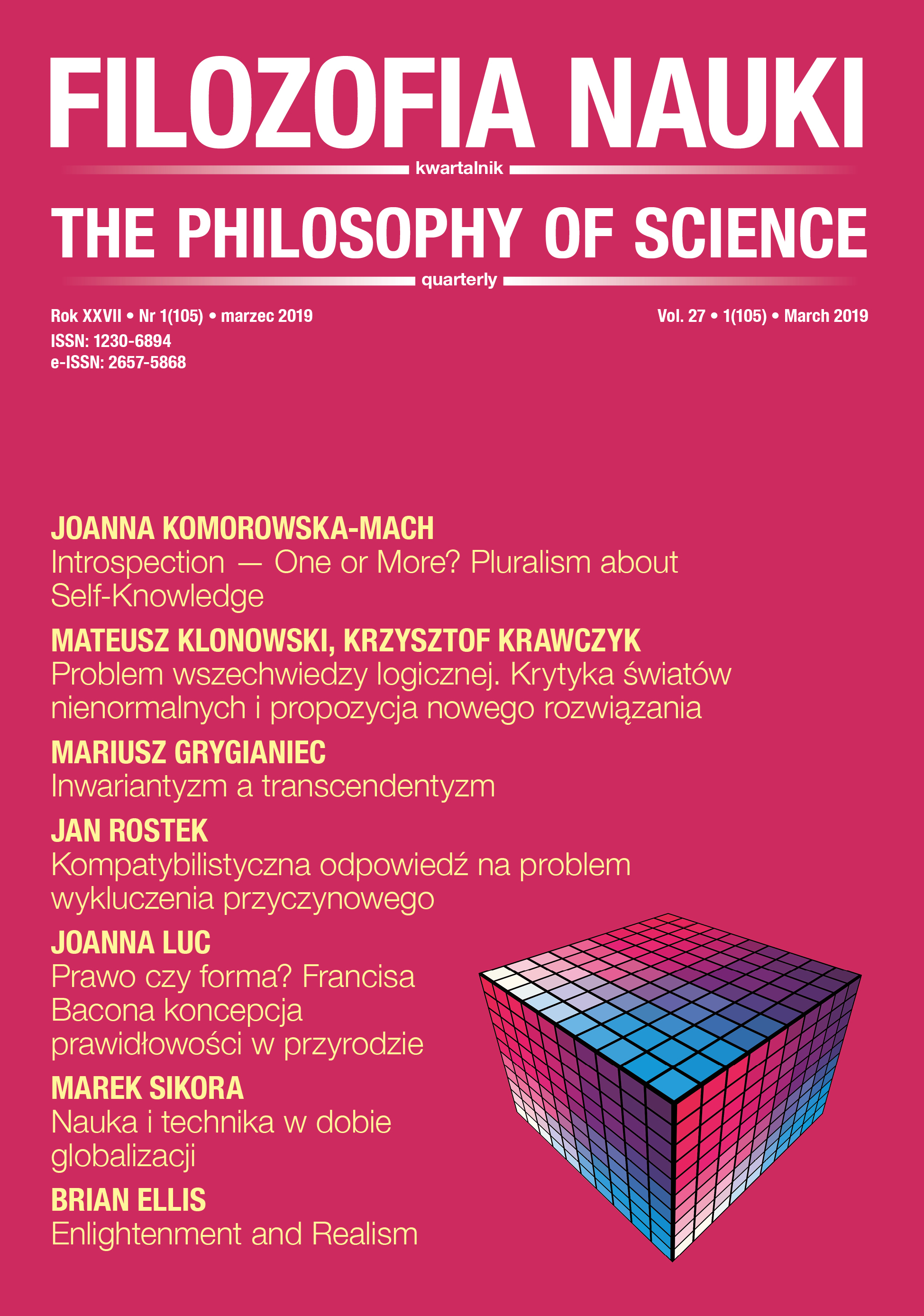Inwariantyzm a transcendentyzm
DOI:
https://doi.org/10.14394/filnau.2019.0003Słowa kluczowe:
Peter Simons, Damiano Costa, invariantism, transcendentism, persistence, continuants, occurrents, genidentityAbstrakt
In a number of works, Peter Simons proposed an interesting theory of persistence in time, which he sometimes describes as invariantism. Unfortunately, in the last two decades, despite its unquestionable merits, invariantism has attracted little interest among thinkers engaged in the debate over persistence. The debate continues to revolve around well-known solutions, i.e., endurantism, perdurantism, and exdurantism. It seems to ignore the efforts of the few thinkers who try to break the theoretical deadlock that has for many years dominated the discussion. The purpose of this article is, first, to reconstruct and critically analyze Simons’ invariantist theory, and second, to compare it with another theoretical proposal, namely transcendentism, recently advanced by Damiano Costa and Alessandro Giordani. By means of a simple comparative analysis, I shall try to show that these views are convergent: they differ only in a few elements that are either negligible or could be accepted within both theories. This result should not, however, be interpreted as an attempt to formulate a hybrid position. On the one hand, transcendentism can be treated, to some extent, as a fairly natural foundation of invariantism, whereas invariantism can
be regarded as a technical development of transcendentism (providing it with a suitable remedy for some interpretative difficulties). On the other hand, invariantism and transcendentism interpret temporal location of objects completely differently, and so, at the end of the day, their paths must diverge. The indirect aim of the paper is to show that both invariantism and transcendentism should no longer be ignored in the debate on the nature of persistence.
Bibliografia
Barker S., Dowe P. (2003), Paradoxes of Multi-location, "Analysis" 63(2), 106-114. https://doi.org/10.1093/analys/63.2.106
Barker S., Dowe P. (2005), Endurance is Paradoxical, "Analysis" 65(1), 69-74. https://doi.org/10.1093/analys/65.1.69
Beebee H., Rush M. (2003), Non-paradoxical Multi-location, "Analysis" 63(4), 311-317. https://doi.org/10.1093/analys/63.4.311
Braddon-Mitchell D., Miller K. (2006), The Physics of Extended Simples, "Analysis" 66(3), 222-226. https://doi.org/10.1093/analys/66.3.222
Calosi C., Fano V. (2015), A New Taxonomy of Persisting (Relativistic) Objects, "Topoi" 34(1), 283-294. https://doi.org/10.1007/s11245-013-9212-9
Costa D. (2014), Being in Time. A Theory of Persistence and Temporal Location, dissertation, University of Geneva.
Costa D. (2017), The Transcendentist Theory of Persistence, "Journal of Philosophy" 114(2), 57-75. https://doi.org/10.5840/jphil201711425
Costa D., Giordani A. (2016), In Defence of Transcendentism, "Acta Analytica" 31(2), 225-234. https://doi.org/10.1007/s12136-015-0270-z
Daniels P. (2013), Endurantism and Paradox, "Philosophia" 41(4), 1173-1179. https://doi.org/10.1007/s11406-013-9463-0
Gallois A. (1998), Occasions of Identity. The Metaphysics of Persistence, Change, and Sameness, New York: Oxford University Press.
Gallois A. (2017), The Metaphysics of Identity, New York: Routledge. https://doi.org/10.4324/9780203756218
Giordani A., Costa D. (2013), From Times to Worlds and Back Again: A Transcendentist Theory of Persistence, "Thought: A Journal of Philosophy" 2(1), 210-220. https://doi.org/10.1002/tht3.79
Gołosz J. (2011), Upływ czasu i ontologia, Kraków: Wydawnictwo Uniwersytetu Jagiellońskiego.
Grygianiec M. (2005), Variants and Criteria of Genidentity [w:] Logic, Methodology, and Philosophy of Science at Warsaw University, vol. 2, A. Brożek, J. J. Jadacki, W. Strawiński (eds.), Warszawa: Wydawnictwo Naukowe Semper, 161-171.
Grygianiec M. (2011), Aksjomatyczne definicje genidentyczności, "Filozofia Nauki" 19(1) [73], 25-37.
Grygianiec M. (2016), Criteria of Identity and Two Modes of Persistence, "Filozofia Nauki" 24(2) [94], 1-13.
Ingarden R. (1987), Spór o istnienie świata, t. 1, Warszawa: Państwowe Wydawnictwo Naukowe.
Johnson W. E. (1924), Logic, vol. 3, Cambridge: Cambridge University Press.
Markosian N. (1998), Simples, "Australasian Journal of Philosophy" 76(2), 213-226. https://doi.org/10.1080/00048409812348361
McDaniel K. (2003), No Paradox of Multi-location, "Analysis"" 63(4), 309-311. https://doi.org/10.1093/analys/63.4.309
McDaniel K. (2007), Extended Simples, "Philosophical Studies" 133(1), 131-141. https://doi.org/10.1007/s11098-006-9010-y
Melia J. (2000), Continuants and Occurrents, "Proceedings of the Aristotelian Society" 74(1), 77-92. https://doi.org/10.1111/1467-8349.00064
Miller K. (2013), Times, Worlds, and Locations, "Thought. A Journal of Philosophy" 2(1), 221-227. https://doi.org/10.1002/tht3.86
Parsons J. (2007), Theories of Location [w:] Oxford Studies in Metaphysics, vol. 3, K. Bennett, D. W. Zimmerman (eds.), Oxford: Oxford University Press, 201-232.
Piwowarczyk M. (2010), Endurance and Temporality, "Polish Journal of Philosophy" 4(2), 157-169. https://doi.org/10.5840/pjphil20104222
Porwolik M. (2017a), Aksjomatyczne ujęcia genidentyczności według Zdzisława Augustynka. Część I. Porównanie systemów, "Filozofia Nauki" 25(3) [99], 5-40.
Porwolik M. (2017b), Aksjomatyczne ujęcia genidentyczności według Zdzisława Augustynka. Część II. Definicje warunkowe, "Filozofia Nauki" 25(4) [100], 87-114.
Simons P. (2000a), Continuants and Occurrents, "Proceedings of the Aristotelian Society" 74(1), 59-75. https://doi.org/10.1111/1467-8349.00063
Simons P. (2000b), How to Exist at a Time When You Have No Temporal Parts, "The Monist" 83(3), 419-436. https://doi.org/10.5840/monist200083321
Simons P. (2000c), Identity through Time and Trope Bundles, "Topoi" 19(2), 147-155. https://doi.org/10.1023/A:1006485216998
Simons P. (2004), Extended Simples. A Third Way Between Atoms and Gunk, "The Monist" 87(3), 371-384. https://doi.org/10.5840/monist200487315
Simons P. (2008a), Modes of Extension. Comments on Kit Fine's 'In Defence of Three-Dimensionalism', "Royal Institute of Philosophy Supplement" 62, 17-21. https://doi.org/10.1017/S1358246108000556
Simons P. (2008b), The Thread of Persistence [w:] Persistence, Ch. Kanzian (ed.), Frankfurt: Ontos, 165-184.
Simons P. (2013), Continuant Causation, Fundamentality, and Freedom [w:] Mental Causation and Ontology, S. C. Gibb, R. Ingthorsson (eds.), Oxford: Oxford University Press, 233-247. https://doi.org/10.1093/acprof:oso/9780199603770.003.0011
Simons P. (2014), Where It's At: Modes of Occupation and Kinds of Occupant [w:] Mereology and Location, S. Kleinschmidt (ed.), Oxford: Oxford University Press, 59-68. https://doi.org/10.1093/acprof:oso/9780199593828.003.0004



















 Filozofia Nauki | ISSN 1230-6894 | e-ISSN 2657-5868
Filozofia Nauki | ISSN 1230-6894 | e-ISSN 2657-5868